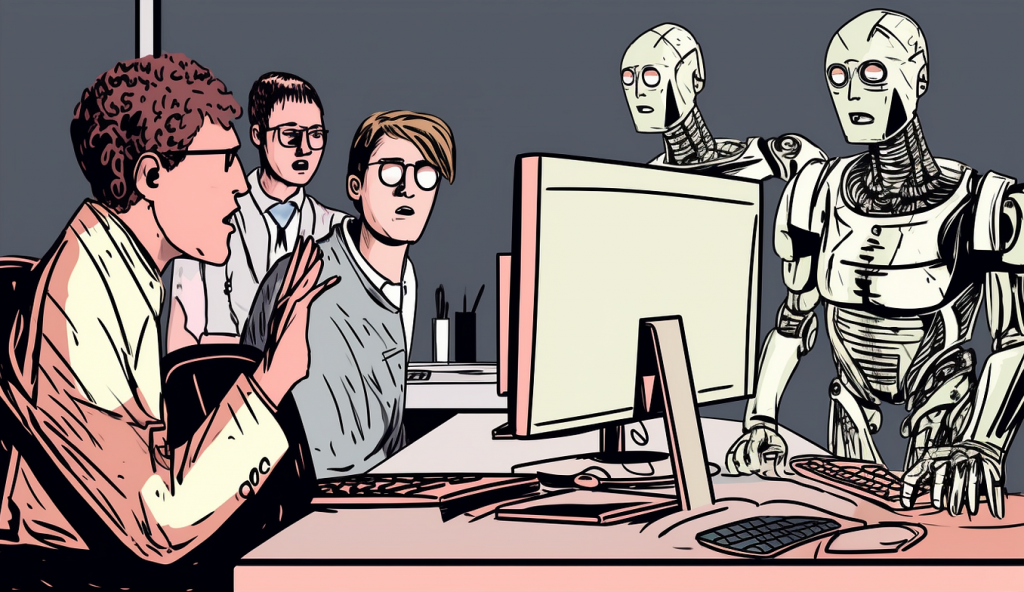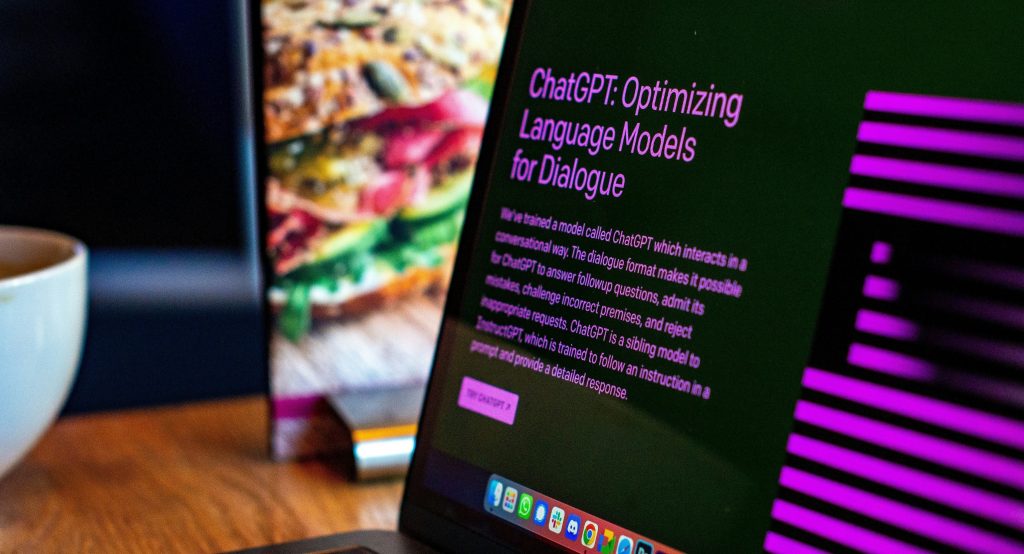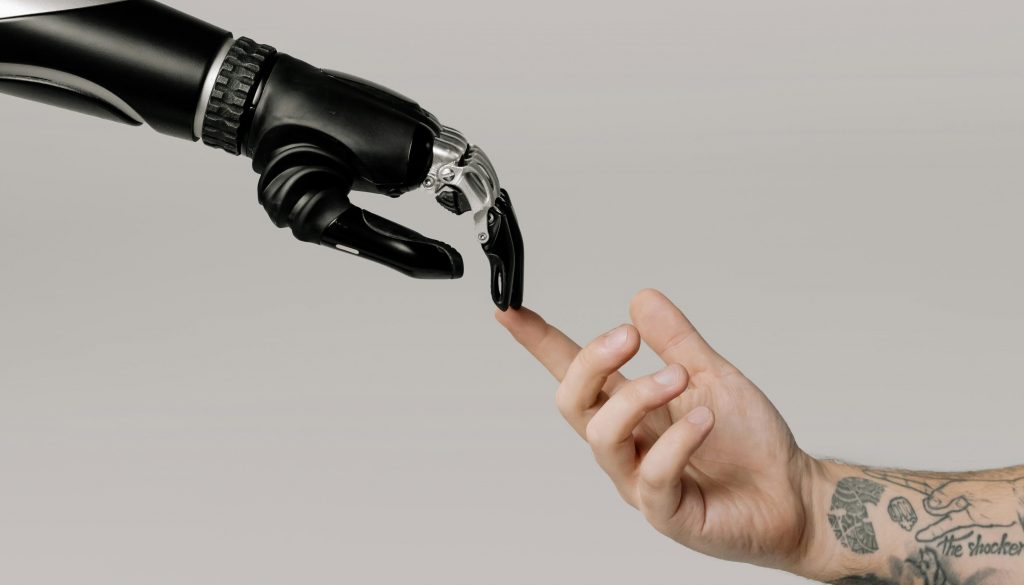
Will AI Replace Programmers? The Future Of Programming
Jerry Wallis
11 min read

Unless you’ve been living in an alternate universe, you’ve no doubt heard about ChatGPT, OpenAI, Gemini and the AI hype that’s taken over the tech world.
ChatGPT, especially, has been getting tons of attention ever since its launch in late 2022. According to OpenAI, ChatGPT surpassed 1 million users within just 5 days of its launch!
To put this into perspective, it took Instagram roughly 2.5 months to reach the same milestone in downloads, while Netflix had to wait for 3.5 years to reach 1 million users.
If you look at its current statistical dominance, openai.com gets approximately 1.5 billion visits per month. That’s seriously impressive!
Let’s say it… the hype surrounding AI is real!
But with all this talk about AI, many programmers, especially those who are still learning or just starting, are worried about what it means for their jobs. 😱
They’re asking questions like:
- Will AI replace programmers?
- Should I even bother learning to code if AI can do it better?
- Will companies still hire programmers?
Now, these are totally understandable concerns. But, here’s the scoop: AI isn’t going to kick programmers to the streets. That said, it is, without a doubt, poised to revolutionise the future dynamics of programming and software development.
Fret not! We’re here to break it down for you. We’ll explore the impact of AI on programming, understand what AI for coding is all about and whether it’s likely to revolutionise coding jobs as we know them. Plus, we’ll provide some helpful tips on how to stay ahead in your programming career in the age of ‘all things AI’. Ready to dive in?
The Role of AI in Modern Software Development 🤖
It’s clear that the landscape of software engineering has undergone a transformative shift with the emergence of AI. This evolution isn’t merely a technological advancement; it signifies a fundamental redefinition of the longstanding principles that have long governed software engineering.
For brands looking to evolve digitally, understanding how AI integrates with the software development process isn’t just helpful—it’s a strategic necessity. It’s now a must-have and not merely a bonus.
AI is changing how we develop software from start to finish, and some believe it could make coding 10X faster. Now, that could be sort of a stretch but AI is indeed poised to change everything from how we create and maintain software to how decisions are made in engineering teams. Crafting a good AI strategy is thus crucial for businesses looking to thrive in the modern era.

Image courtesy of Appy Official
However, a pressing question arises: Will AI replace programmers? Whilst it’s exciting to think about AI’s possibilities, it’s also important to be careful and use it wisely and deliberately to avoid potential risks.
Let’s delve into the influential role of AI in software engineering and uncover its significance in today’s tech-driven world.
From Design to Platform Thinking 🧠
In the past, software development typically began with designers crafting static mockups or wireframes to outline how a software or application should appear. However, the emergence of AI has ushered in a new era of “platform thinking.” Instead of relying on fixed designs, developers now focus on building dynamic platforms that can adapt to user behaviour.
Take Netflix, for instance. Traditionally, the interface of a streaming service might have been designed based on predetermined layouts. But with AI, platforms like Netflix continuously analyse user interactions and preferences in real-time. They then use this data to make dynamic adjustments, such as recommending personalised content or refining the user interface to enhance the viewing experience.
This approach ensures that the software remains relevant and efficient, evolving alongside user needs and providing them with a seamless user experience.
AI Automation & Software Development 🛠️
AI automation is reshaping software development, boosting efficiency and accuracy across tasks like code generation, bug detection, and testing. Tools like DeepCode scan vast code repositories, saving time and improving code quality. Beyond coding, AI streamlines project management by handling tedious tasks, freeing developers for more meaningful work.
ChatGPT for Coding 💻
The concept of AI coding has gained significant interest in recent times. Tools like ChatGPT are widely used by software developers for writing code. With its machine-learning abilities, ChatGPT can analyse code pieces and make new ones based on the input you provide. To get the best results, however, it’s crucial to provide clear and detailed prompts.
Using ChatGPT for coding is quite straightforward if done right: just give it a prompt or a description of the code you need, and it’ll generate a matching snippet. ChatGPT is great for helping with specific coding jobs, not for building whole applications or software from scratch.
Now, this leads us to some intriguing questions (which we’ve answered below):
1. Does ChatGPT replace programmers?
Not yet, or maybe not for a while. ChatGPT operates at the skill level of a talented beginner programmer. While it might lessen the need for beginner programmers, for now, it mainly helps them (and even more experienced ones) write code and find information more easily.
It’s definitely a time-saver and a great helping hand. And perhaps your AI coding buddy. But as things stand, there are only a few coding tasks it can handle independently. That said, who knows what it will be capable of by 2030?
2. Is ChatGPT-generated code error-free?
Absolutely not! Yet, placing complete trust in human-written code is not without its risks. Errors frequently arise during the coding process, making bugs nearly unavoidable. It’s imperative to conduct thorough testing before deploying any code using AI.

Despite these meticulous measures, bugs may still slip past detection. Merely because AI is involved in coding doesn’t guarantee flawless output. Blind trust is ill-advised; always verify and inspect.
3. If ChatGPT writes my code, who owns it?
As it stands, there’s insufficient case law to provide a definitive answer to this question. In the US, Canada, and the UK, copyright typically requires human authorship, potentially rendering AI-generated code ineligible for protection.
However, in this shifting landscape, taking the necessary caution is crucial. The lack of clear regulations adds complexity to the ownership of AI-generated content, requiring urgent legal frameworks.
Unlike human creativity, AI learns from vast datasets, blurring the lines of authorship. Thus, legal challenges persist, questioning whether AI can be deemed the rightful owner of its creations. Ongoing litigations highlight the complexities, emphasising the need for transparent citation practices to mitigate risks.
Navigating this terrain requires proactive legal compliance to safeguard against intellectual property infringements. Remember to be careful about who owns the code ChatGPT generates, and always double-check its reliability.
Dive deeper into this topic and learn the ins & outs of AI Tools & Intellectual Property (IP) here.
AI-Powered Prototyping 📝
AI accelerates prototyping by generating functional proofs of concept (POCs) efficiently. Unlike mere sketches or design mockups, these POCs represent fully operational software components. By leveraging AI, developers can swiftly generate these POCs, enabling them to explore diverse ideas and features. This rapid prototyping facilitates concept refinement and early detection of potential challenges in the development process.
Improved Software Development Security 🛡️
AI plays a pivotal role in enhancing security within software development, leveraging advanced algorithms for fast threat detection and response. This proactive approach goes beyond mere problem identification, focusing on preemptively addressing potential threats before they become exploitable.
For instance, companies like Google utilise AI-driven security solutions to continuously monitor their systems. These systems promptly flag any unusual activities, allowing for timely intervention to stop potential security threats.
What does this mean for Software Developers? 🤔
The looming question of whether artificial intelligence (AI) will render software developers obsolete is stirring intense debates within the developer community.
On one side of the spectrum, some foresee a future where AI seamlessly takes over the tasks currently performed by developers, potentially leading to widespread job replacement.
Conversely, some optimists believe that AI will serve as a powerful tool, enhancing the capabilities and productivity of software engineers rather than replacing them entirely.
Navigating through this complex terrain, it becomes evident that there is no concrete answer to this pressing question – at least for now. The impact of AI on software development remains shrouded in uncertainty, with several key factors influencing the trajectory of this technological revolution.
1. Role of AI Development Pace 📈
One crucial determinant is the pace of AI development itself. As AI technologies evolve at an unprecedented rate, the likelihood of them intruding upon tasks traditionally carried out by developers increases exponentially. The faster AI progresses, the more probable it becomes that it will assume a greater share of development responsibilities.
2. Accessibility of AI Technology 👩💻
Moreover, the accessibility of AI plays a pivotal role in shaping its integration into the development landscape. As the cost of AI continues to plummet, businesses of all sizes gain access to tools capable of automating various development tasks. While this accessibility fosters efficiency and innovation, it also raises concerns about potential job losses, particularly among entry-level developers. So we can say the threat is real!
3. Skills and Adaptability 🎓
However, amidst these uncertainties, the skills possessed by software engineers emerge as a critical variable! Those adept at harnessing AI technologies are poised to thrive in an AI-dominated landscape, commanding a premium in a marketplace hungry for their expertise. Conversely, developers reluctant to embrace AI risk being left behind in an industry propelled by relentless technological advancement.
4. Future Dynamics 🔮
In light of these considerations, the future of software development hinges on the ability of developers to adapt and evolve alongside AI. Those willing to expand their skill sets and embrace the transformative potential of AI stand to gain a competitive edge in an ever-evolving software industry.
5. Conclusion ✨
Ultimately, the relationship between AI and software developers is not one of displacement but of symbiosis—a partnership where irreplaceable human intelligence joins forces with machine intelligence to unlock new untapped possibilities in the software development space.
As the boundaries of what is possible continue to blur, developers who embrace this paradigm shift will play a pivotal role in shaping the future dynamics of programming.
Our Recommendations For Software Engineers💡
Embrace AI as a tool to supercharge your skills and efficiency rather than seeing it as a treat. While there’s fear about AI potentially replacing software engineers, it’s improbable to displace high-value developers who tackle intricate and pioneering software projects.
To safeguard against the threat of AI displacement, prioritise crafting sophisticated and imaginative solutions. Stay updated with the latest advancements in AI and software engineering, as this field is in constant flux.

Keep in mind that AI and software engineering can harmonise effectively, with AI complementing human capabilities. By embracing AI as a co-worker, you can thrive and leverage its capabilities to deliver seamless, intuitive software solutions.
Here are some tips for preparing for the AI-driven future (let’s face it, it’s already here):
- Educate yourself about AI: Enroll in courses, delve into AI training, and attend conferences.
- Cultivate AI expertise: Sharpen skills in machine learning, data science, and cybersecurity.
- Stay informed: Stay ahead of industry advancements on the latest AI technologies and trends.
- Embrace adaptability: Be open to change and ready to acquire new skills and technologies essential in this AI-centric era.
Instead of viewing AI as a threat, consider it a powerful tool (a helpful friend) that can augment your skills and capabilities as long as you continue to refine your craft.
Embrace the Future with AI 🚀
While AI brings many benefits to organisations, it still needs human input to function properly. Our unique abilities, such as critical thinking and creativity, can’t be replaced by AI. Therefore, instead of replacing programmers, AI creates more demand and opportunities for them. The future of software development relies on using AI deliberately to spark productivity, creativity, and innovation!
Ready to build a top-notch, intuitive software application that embraces AI for improved efficiency and ROI? Get in touch with us now to turn your development goals into reality with our AI-trained teams.
Topics
Published On
March 05, 2024

